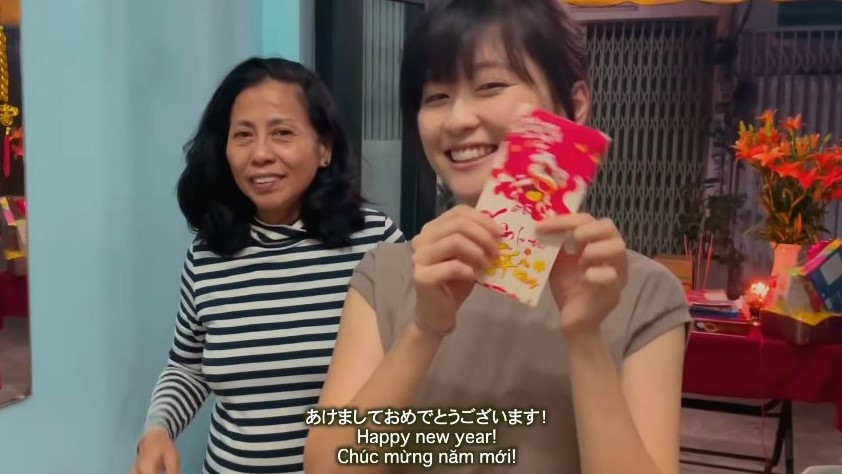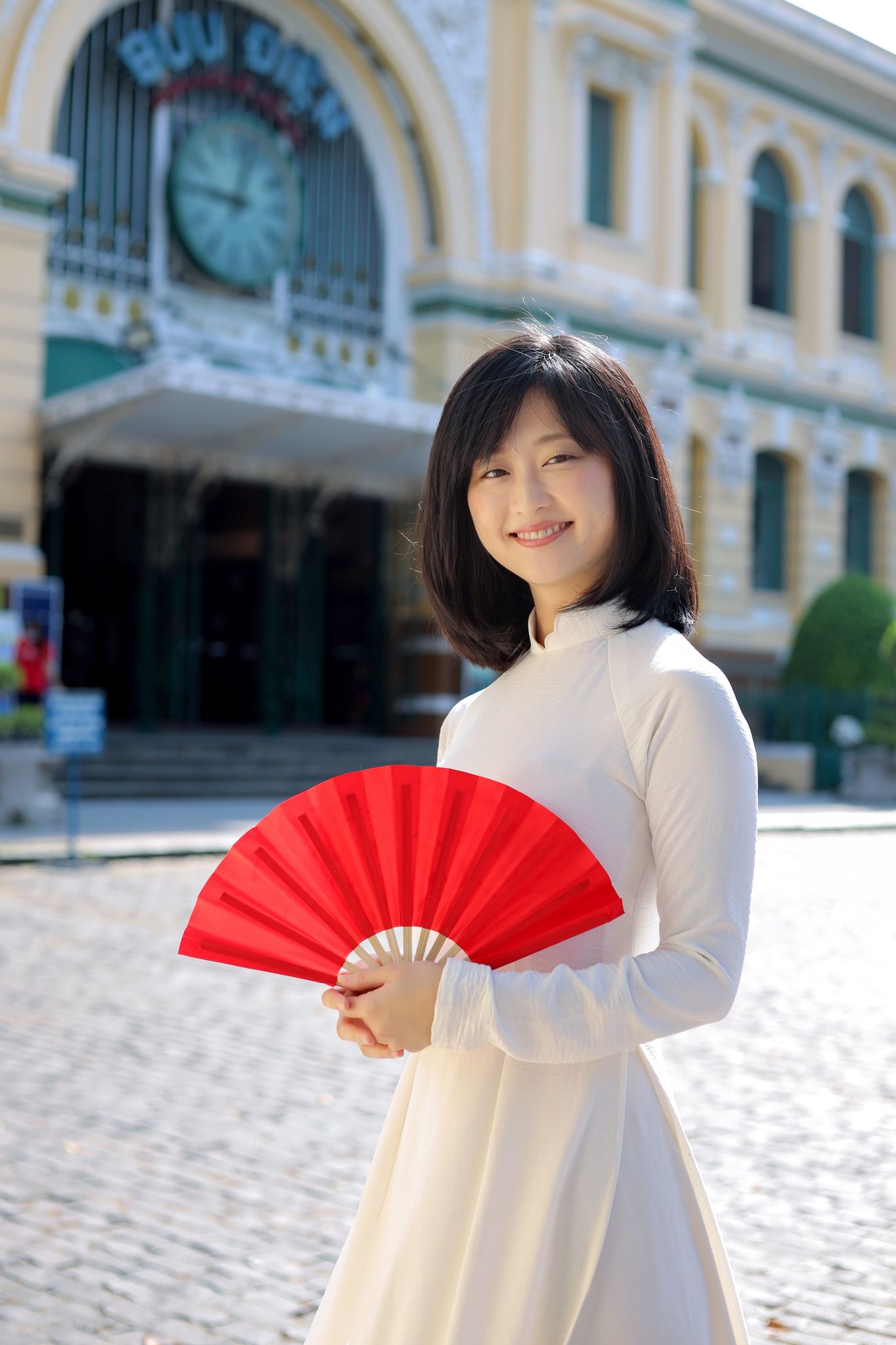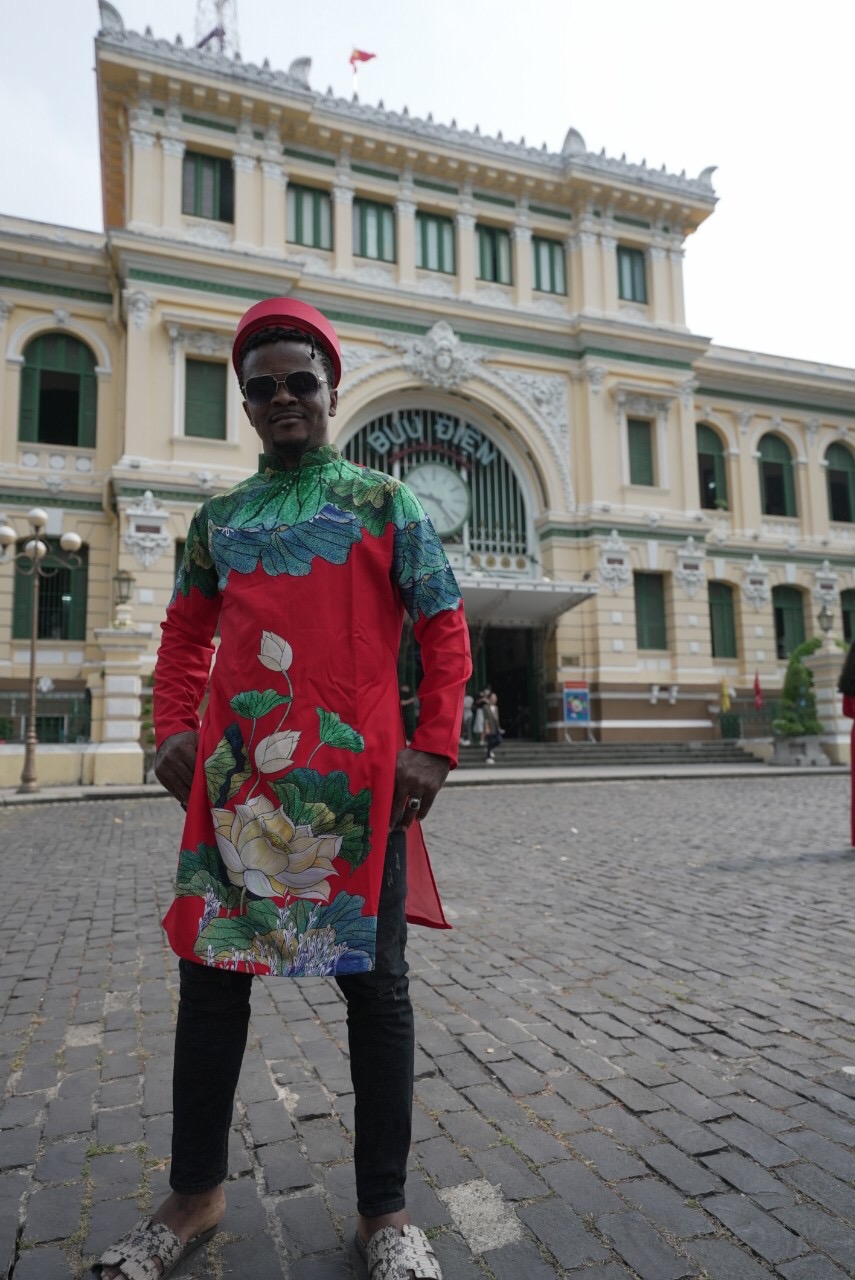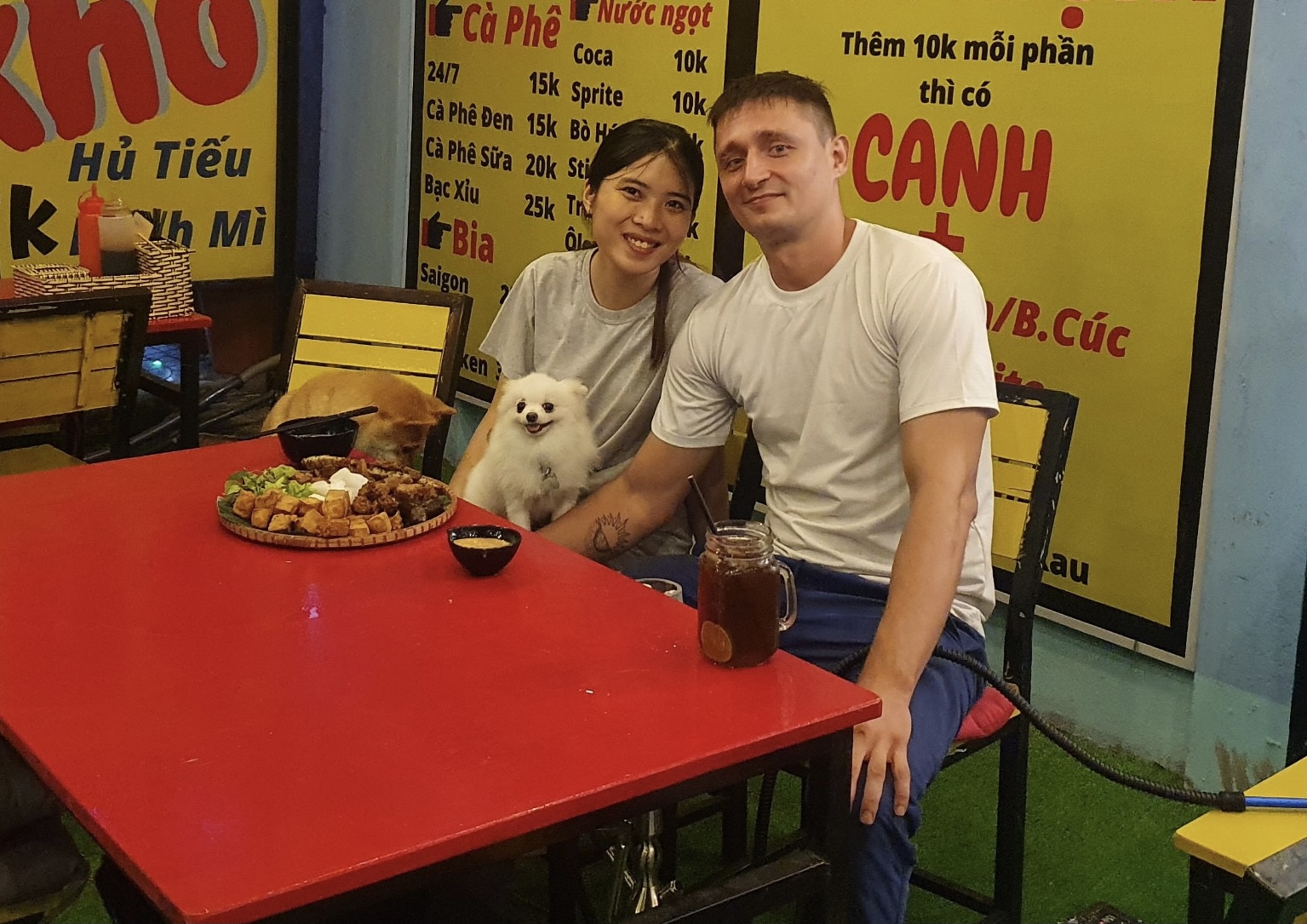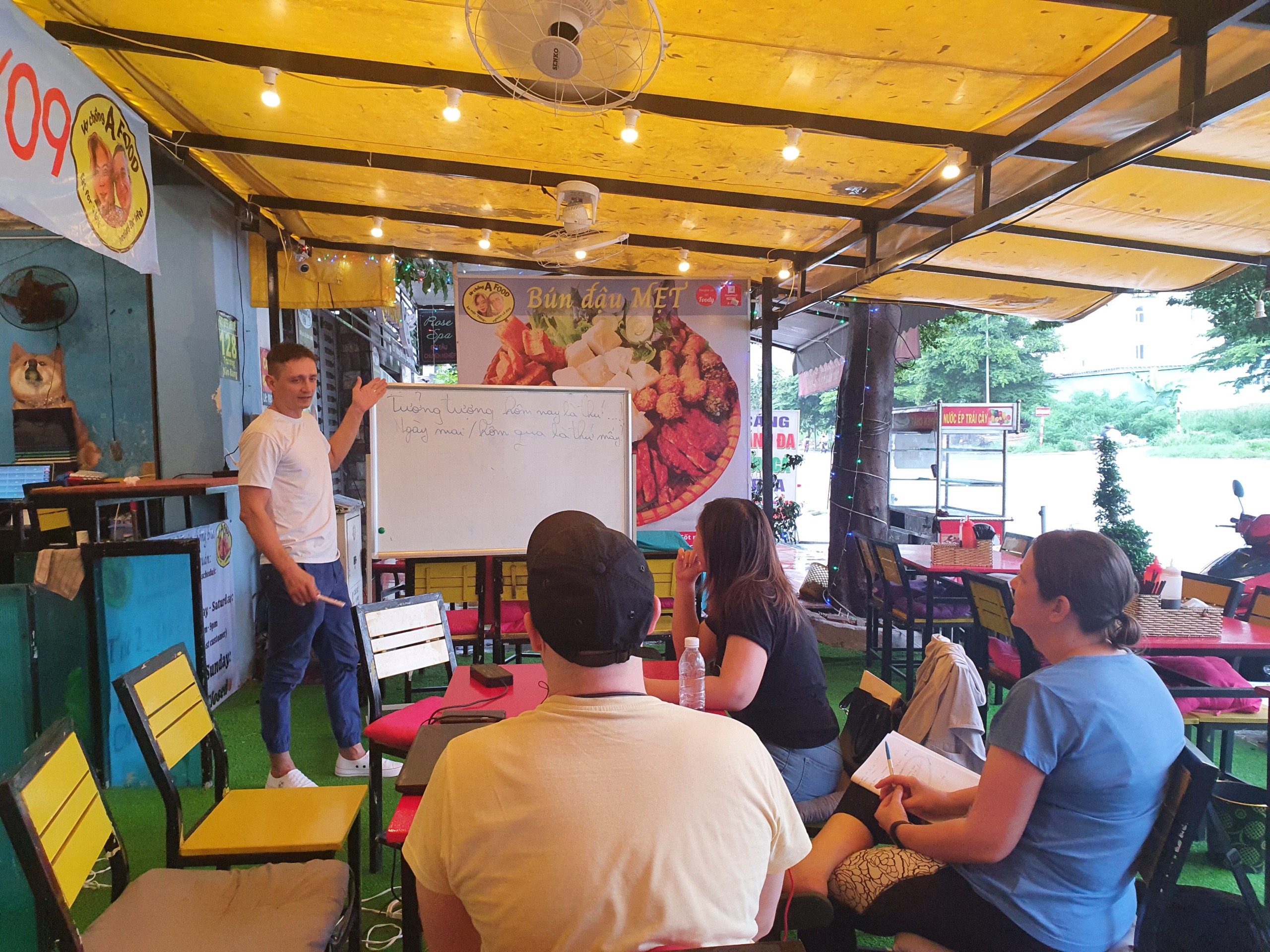For foreigners who have lived in Vietnam for years and have become well known on social media, Tet (Vietnamese Lunar New Year) is an exciting time.
Each year, Tet brings unforgettable emotions and interesting discoveries that only bolster their love for Vietnamese culture.
Akari Nakatani and her Vietnamese family
Japanese national Akari Nakatani has not missed a single Tet holiday during her six years in Vietnam.
When Nakatani first came to Vietnam, she lived with the family of her Vietnamese best friend, and every year she celebrates Tet with that special group of people.
Last year, she was chosen to be the first person to enter the house on Lunar New Year's Day, a tradition that is believed to help bring good luck to the family for the whole year.
She also received lucky money from her friend's mother, whom Nakatani also calls 'mom.'
A YouTuber with 161,000 subscribers, Nakatani shared her 2021 Tet experience on her channel with her excited audience.
|
|
| Akari Nakatani (right) smiles while receiving lucky money during the Tet holiday in 2021 in a screenshot captured from a video she posted on YouTube. |
“We don’t have these traditions in Japan,” 28-year-old Nakatani told Tuoi Tre News.
“All the things that Vietnamese do for Tet are very cultural and meaningful.
“It's always interesting to learn and experience more about Vietnamese culture.”
For this year’s Tet holiday, she will, once again, stay with her Vietnamese family and spend time relaxing with her Vietnamese ‘mom.’
“My favorite thing about Tet is seeing family members,” she said.
“On the holiday, I have so many opportunities to talk to different generations, which is very special for me as a foreigner living here in Vietnam,” Nakatani, a fluent Vietnamese speaker, added.
From having no knowledge of Tet when she first arrived in Vietnam, Nakatani now understands how important it is to Vietnamese people.
The connection between Nakatani and Vietnam is unbreakable thanks to her best friend, a Vietnamese student she met in Japan.
“I have a lot of international friends, but she is the one who has most impacted my perspective on life,” Nakatani admitted.
“The more I learned from her, the more I was interested in her home country, Vietnam.
“So, I decided to come to Vietnam after graduation for my new journey in life.”
|
|
| Akari Nakatani is seen wearing 'ao dai' (Vietnam's traditional long gown) in this supplied photo. |
Special culture shock
After 13 years of living in Vietnam, Nigerian national Nnadozie Uzor Nadis typically goes by his Vietnamese name, Nam.
Nadis, a YouTuber with 73,000 followers, shared that his understanding of Tet is what keeps him in the country during this time of year.
He no longer uses the extended holiday to travel abroad, but he always arranges to make sure he is around to celebrate the occasion.
This year, he plans to welcome the first days of the year in Ho Chi Minh City, make some videos to introduce the holiday to friends and family abroad, and then travel to neighboring provinces to visit his friends and their families.
“Many friends have invited me to visit their house and I am very happy to be part of their families during Tet,” Nam said.
But the holiday was not so easy for Nam when he first arrived in Vietnam.
Back then, Tet was a 'culture shock' for him as all the shops and restaurants stayed closed during the week-long holiday.
“I did not have many friends then so I was bored and chose to travel to other countries when Tet came,” he recalled.
“But everything has changed since I began to understand the meaning of Tet.”
Now, Nam’s family and relatives in Nigeria and the U.S. even turned to call Tet ‘his New Year’ or ‘his holiday,’ and even did bank transfers to give him lucky money.
For Nam, Tet is a time to visit spring flower markets and watch people carrying yellow apricot trees and peach trees to their homes.
Tet is also a time when he can look back on the past, spend time with loved ones, put aside work, and gather with friends over a happy Tet meal.
“This year I will wear ao dai to celebrate Tet,” Nam said.
“One special thing about Vietnamese ao dai is that it is quite similar to the traditional dress in Nigeria, so it is very familiar.
“Wearing Vietnamese ao dai reminds me a lot of my homeland."
|
|
| Nnadozie Uzor Nadis is seen wearing 'ao dai' in this supplied photo. |
The TikTokers who marry Vietnamese partners
Valentin Constantinescu, a Romanian, also considers Tet to be a very special time.
The 38-year-old, known for his stunning grasp of the Vietnamese language, still remembers the first day when he arrived in Vietnam, on October 1, 2004. Since then, he has not missed a single Tet holiday.
“Seeing people eager to go shopping for Tet makes me feel happy,” the TikToker with more than 251,000 followers said.
“I like the peace and quietness of Hanoi when Tet comes.
“It feels like the whole city is closed to rest, relax, and have a good time after a long year of hard work.”
Currently, Constantinescu and his Vietnamese wife live in Ho Chi Minh City and the pandemic has stopped them from seeing their family during this Tet holiday season.
“My wife is a Hanoian, since the day we moved to Ho Chi Minh City, every Tet, if we don't fly to Hanoi, my wife's parents will come here,” Constantinescu said.
“This year, due to the epidemic, all our plans failed, so I guess we will have a simple celebration for Tet.”
Although the Romanian cannot spend the holiday with his in-laws, the last three Tet holidays have been very special for him.
“Since getting married, I have had the most complete and meaningful Tet holidays, because I have a family to 'come home to celebrate with,’ I have been able to 'gather and reunite,’ and I’ve also been able to shop for Tet with friends and family,” Constantinescu said in Vietnamese.
|
|
| Valentin Constantinescu and his Vietnamese wife are seen in this supplied photo. |
Constantinescu approached the decision to move to Vietnam following a recommendation from his uncle, who was a diplomat working in the Southeast Asian country, when he was about to graduate from high school.
“Initially, I was reluctant to study in Vietnam in the Vietnamese language because even though I knew a lot about Vietnam and its history, I was under the impression that the language would use a pictographic alphabet, like Japanese, Korean, or Chinese,” Constantinescu recalled.
“I am not comfortable learning a new language if it uses a different alphabet, so when my uncle told me that they use the Latin alphabet in Vietnam, I was super excited!
“During the first week of living in Hanoi, I had already decided that I was going to never leave Vietnam.
“I couldn't see any reason to do so and, over 17 years later, I still don't!”
When asked why he loves Vietnam, Constantinescu said he has no reason for not loving the country, mentioning its rapid development, improving life quality, friendly people, super good foods, amazing language, and low criminal rate.
From a man who had no idea what language is used in Vietnam, Constantinescu now devotes himself to teaching Vietnamese and English for free in the country.
|
|
| Valentin Constantinescu is seen teaching English to foreigners in Vietnam in this supplied photo. |
“I really hope that by next year's Tet, the epidemic will have been gone because everyone has suffered a lot,” he said.
“Hopefully we will be able to see the fireworks again on New Year's Eve, and will be able to go shopping for apricots and peaches comfortably without having to worry about bringing the disease home."
Meanwhile, Sofiia Phan spent four years studying Vietnamese and English philology in Ukraine’s Kiev National University before coming to Vietnam for another two years of pursuing her master's degree.
After finishing her college life in Vietnam, the Ukrainian woman decided to stay and married a Vietnamese man she met at university in Kiev. She is now living her sixth year in Vietnam.
“Actually, I knew a lot by that time, because I studied about Vietnamese culture and history at the university,” she said.
“I also knew about Tet before I moved to Vietnam.
“It is the most important holiday for Vietnamese people when they are coming back home seeing all the people closest to them.
“It's a really nice and warm atmosphere.”
Since the couple welcomed a baby nine months ago, Phan has spent most of her time on taking care of the baby and developing the family’s social networks on Instagram, YouTube, and a Tiktok channel of 273,000 followers where she posts short videos about her international family.
“A peach blossom tree was bought, nem [fried spring rolls] will be cooked and we will celebrate the holiday with our friends and family,” she shared about the couple’s plan for Tet this year.
|
|
| Sofiia Phan and her Vietnamese husband are seen in this supplied photo. |
Like us on Facebook or follow us on Twitter to get the latest news about Vietnam!




